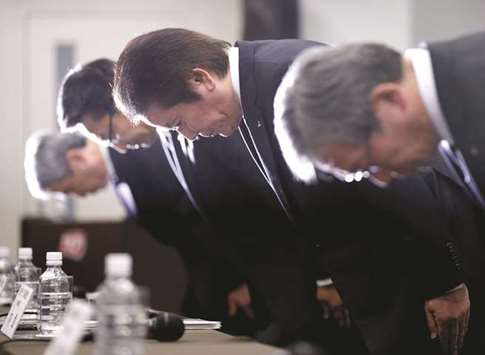Japan’s reputation for manufacturing prowess took another hit as Mitsubishi Materials Corp admitted it falsified data on some products just weeks after a similar scandal engulfed Kobe Steel Ltd.
Buyers of Japanese industrial goods from Boeing Co to Airbus were once again scrambling to confirm whether safety had been compromised after Mitsubishi Materials said three of its units had faked data on products that may have been delivered to more than 250 customers. Its shares plunged as much as 11% in Tokyo, the most in eighteen months.
Mitsubishi Cable Industries Ltd falsified data on rubber seals, while Mitsubishi Shindoh Co misreported the strength of metal strips for auto parts, according to a statement on Thursday. The products may have been shipped to 229 Mitsubishi Cable clients, in industries ranging from aerospace to electric power, and 29 customers of Mitsubishi Shindoh. The two subsidiaries accounted for about 12% of total revenues in the year ended March.
A third unit, Mitsubishi Aluminum Co, also supplied products that didn’t meet standards, although it has already confirmed with customers that they are safe, the company said, adding that its investigation hasn’t uncovered any cases that raise the possibility of legal violations or safety issues.
The revelation is the latest in a series of scandals to dent the image of Japanese manufacturers and echoes closely the admissions by Kobe Steel that it falsified data on the strength and durability of its products. In the auto sector, Nissan Motor Co has said it conducted vehicle inspections that didn’t comply with regulations for almost four decades, while Subaru Corp allowed uncertified workers to inspect vehicles before shipment. Takata Corp filed for bankruptcy earlier this year because of faulty airbags.
Mitsubishi Materials closed 8.1% lower, wiping almost $400mn from its market value. Its stock had hit a two-year high earlier in the month, buoyed by stronger global metals prices. While the units affected are relatively small, the company said it can’t yet quantify the impact on its earnings.
Mitsubishi Materials president Akira Takeuchi told a briefing in Tokyo on Friday that the company didn’t disclose the problem when it reported earnings earlier this month because it wanted to find all of the customers affected. Takeuchi also said he won’t quit due to the misconduct.
“My duty is to instruct and supervise the investigation of the causes, and to take preventive measures swiftly,” he said. The company will update on its probe by the end of the year, executive vice president Naoki Ono said.
According to the statement, Mitsubishi Cable uncovered the falsification in February and stopped shipping affected products on October 23; the company told its parent two days later. Mitsubishi Shindoh found out about its problem in October and stopped shipments on October 18, alerting Mitsubishi Materials the following day.
Japanese Trade Minister Hiroshige Seko called the matter “extremely regrettable” earlier on Friday, and said the government would seek an explanation from Mitsubishi Cable on why it took so long to report its problem. He added that he considers it a matter for the companies and not an industry-wide issue.
Kobe Steel’s crisis erupted in early October, collapsing its shares. Although 525 customers were affected, none have reported safety issues and no products have been recalled, allowing its stock to recover some of its losses. So far, shipments to 484 clients have been given the all-clear.
Kobe blamed lax controls and too much focus on profit, which encouraged workers to disregard quality guidelines for a decade or more. It also said it was guilty of setting unrealistically high standards that actually exceeded clients’ expectations. The company was forced to abandon its profit forecasts and has lost quality assurance certification – often demanded by customers as a condition of sale – at seven of its 20 plants.
Aircraft maker Airbus said in a statement it doesn’t directly procure any materials from the Mitsubishi Materials units and is investigating whether any of its suppliers are affected. Boeing Co said it’s reviewing the matter.
Of the almost 25,000 workers at Mitsubishi Materials, Shindoh employs over 1,000 while the Cable unit has about 500, according to the latest figures on company websites. The parent, which produces everything from cement to materials for electronics, had revenue last year of almost $12bn, of which Shindoh and Cable accounted for about $1.4bn.
“Even if Mitsubishi Shindoh and Mitsubishi Cable don’t make up a big portion of the company’s earnings, not just the short-term impact, but the mid and long-term impact on its orders is a cause of concern,” Keiju Kurosaka, senior analyst at Mitsubishi UFJ Morgan Stanley Securities, said in a note.

Mitsubishi Materials Corp president Akira Takeuchi (second right) bows with executive vice president Naoki Ono (second left), Mitsubishi Shindoh Co president Kazumasa Hori (left) and Mitsubishi Cable Industries president Hiroaki Murata during a news conference in Tokyo on Friday. The revelation is the latest in a series of scandals to dent the image of Japanese manufacturers and echoes closely the admissions by Kobe Steel that it falsified data on the strength and durability of its products.
